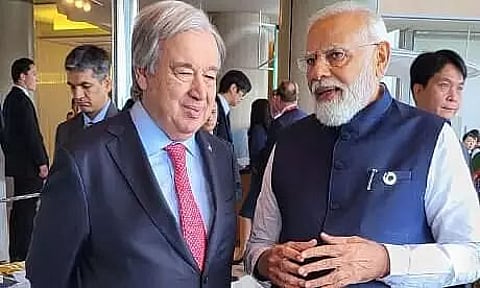
- Home
- Live Blog
- Breaking News
- Top Headlines
- Cities
- NE News
- Sentinel Media
- Sports
- Education
- Jobs

HIROSHIMA: Amid China’s military expansion in the South China Sea and the East China Sea, Prime Minister Narendra Modi said India stands for respecting sovereignty, peaceful resolution of disputes, and adherence to international law.
"India stands for respecting sovereignty, peaceful resolution of disputes, and adherence to international law," PM Modi said in an interview with Japanese newspaper Yomiuri Shimbun during his visit to Hiroshima to attend the Group of Seven (G7) summit. PM Modi was responding to a question by the Japanese publication on how India plans to address China's military expansion in the South China Sea and the East China Sea and the rising tension in the Taiwan Strait to maintain international law and territorial integrity.
"India is committed to protecting its sovereignty and integrity while promoting peaceful resolution of maritime disputes based on international law," Prime Minister Modi said.
He further said that India has successfully resolved land and maritime boundaries with Bangladesh, showcasing its approach.
Asked about the intensifying rivalries among major powers and how India plans to work with them to attain global peace and stability, PM Modi said: "The world faces challenges like the COVID-19 pandemic, disruptions in supply chains, terrorism, and climate change, disproportionately affecting the developing world."
"India prioritises addressing these concerns and emphasises human-centric development through collaboration with Japan and other partners. India aims to serve as a bridge between different voices, promoting a constructive agenda focused on achieving shared objectives for the betterment of humanity," PM Modi said.
PM Modi, who also chairs the G20, emphasised his commitment to leading the international community in resolving the challenges of the "Global South," including developing and emerging countries.
Prime Minister Modi is in Japan from May 19–21 to attend the G7 Summit under the Japanese Presidency at the invitation of Japan's Prime Minister Fumio Kishida.
In his interview with the Japanese publication, PM Modi noted the geopolitical tensions causing disruptions in food and energy supply chains, stressing the need for collaboration with Japan and like-minded countries to continuously address the core concerns of developing countries.
"Strengthening collaboration between the G7 and G20 is vital in addressing global challenges like climate change, supply chain disruptions, economic recovery, energy instability, healthcare, food security, and peace and security," PM Modi said.
The Prime Minister noted the "Special Strategic and Global Partnership" between India and Japan and said that it provides a strong foundation for "our joint efforts, contributing to global cooperation on these issues".
Asked about Russia's invasion of Ukraine, PM Modi reaffirmed his strong support for an international order based on respect for national sovereignty and territorial integrity, underscoring the significance of the UN Charter and international law.
Although India is not a party to the Nuclear Non-Proliferation Treaty and is believed to possess nuclear weapons independently, PM Modi unequivocally stated that the use of weapons of mass destruction is absolutely unacceptable. He expressed his readiness to work with all countries towards a world without nuclear weapons, a vision promoted by Prime Minister Kishida.
"India abstained from UN General Assembly resolutions to condemn the invasion but remains committed to upholding the UN Charter, international law, sovereignty, and territorial integrity. India supports a peaceful resolution to the Ukraine crisis and is ready to contribute constructively within the UN and beyond," he said.
Prime Minister Modi earlier today met his Japanese counterpart, Fumio Kishida, in Hiroshima and discussed ways to enhance "India-Japan friendship across different sectors, including trade, economy, and culture."
"PM @narendramodimet PM @kishida230 in Hiroshima. Both leaders discussed ways to enhance India-Japan friendship across different sectors, including trade, economy, and culture," the Prime Minister's Office (PMO) said in a tweet.
"I want to thank you for inviting India to the G7 Summit. Your (PM Kishida's) visit to India was memorable7 Summit." Your (PM Kishida's) visit to India was memorable. It is a delightful moment for me as the Bodhi tree I gifted you has been planted by you in Hiroshima. I believe India-Japan relations will grow with the growth of this tree," PM Modi said in Hiroshima as he congratulated Kishida on the successful presidency of the G7.
The G7 leaders are currently in Japan to attend the G7 Summit scheduled to be held in Hiroshima from May 19–21. Notably, Japan assumed the G7 presidency in 2023.
The Summit is an international forum held annually for the leaders of the G7 member states of France, the United States, the United Kingdom, Germany, Japan, Italy, and Canada (in order of rotating presidency) and the European Union (EU). (ANI)
Also Watch: